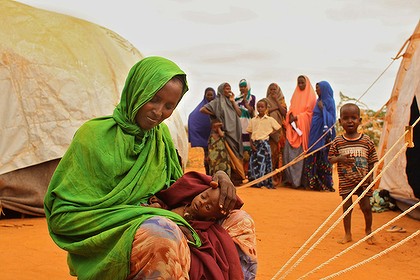The humanitarian crisis in the Horn of Africa
The crisis in the Horn of Africa worsens, with UN officials claiming tens of thousands of Somalis have died over the last three or four months and warning that up to 750,000 people could be at risk in the next few months unless aid efforts are scaled up. Dr Unni Karunakara, International President of Médecins Sans Frontières argues that a reality check is needed when looking at aid efforts in Somalia and that, because of the political chaos and tension between rival clan factions, donors may never be able to access those in desperate need. The discussion of funding and access in Somalia is discussed in more detail here. Kevin Rudd, Australia’s foreign minister, discusses here how women have been disproportionately affected by this crisis and arguing that they must be central to global aid efforts in the region. To make a donation, head here or here.
Humanitarian aid: who gives it and who receives it?
Global Humanitarian Assistance, a new program aiming to provide impartial reporting on the realities of humanitarian aid, has released its 2011 Global Humanitarian Assistance Report[pdf] (summary available here[pdf]). The report gives a recipient and donor breakdown of the $16.7 billion that was contributed to humanitarian responses in 2010, of which $11.8 billion came in the form of ODA. Sudan has remained the largest single recipient of the international humanitarian response for the fifth consecutive year, receiving $1.4 billion. Australia ranked 15th in it’s overall volume of contributions to humanitarian aid between the period of 2000-2009, giving $2.1 billion.
Busan 2011
There are only three months to go before the next High Level Forum on Aid Effectiveness, held triennially, this year in Busan, Korea. Jonathan Glennie and Andrew Rogerson discuss in this ODI opinion piece that the main objective at Busan should be to reach global agreement on a few core standards applying to all major providers of development. An online survey involving over 60 developing countries and 163 has shed light on what the developing world wants and expects from Busan, mostly emphasising the continued push for high quality aid, alignment and capacity development. The results of a roundtable discussion at the Brookings institute held this year are available here [pdf].
The CGD’s MDG progress index
The Centre for Global Development has maintained a Millennium Development Goal Progress Index that was recently updated to include new data for 2009 and 2010. See how countries are going here. An update on the methodologies and discussion of some of the trends is available here.
Leaders and laggards in transparency of fast-start climate finance
The International Institute for Environment and Development has released its latest report[pdf], which presents a new scorecard based on the extent to which developed countries meet a set of common-sense criteria in their climate finance reports to the UN. Australia ranked 4th among ‘developed’ countries that reported to the UN, however they still all score quite low in many indicators on the scorecard, showing that we still have a long way to go in achieving transparent climate finance.
Corruption in developing countries
In a recent paper for the National Bureau of Economic Research, Benjamin Olken and Rohini Pande analyse the levels of corruption in developing countries based on a new generation of well-identified microeconomic studies. They find robust evidence that corruption responds to incentives in a way that is consistent with standard economic theory.
The World Bank’s 40-70% failure rate with ICT projects
In a recent blog, Wayan Vota discusses the findings of the World Bank’s latest Independent Evaluation Group evaluation of World Bank Group Activities in Information and Communication Technologies. Of the $4.2 billion the bank has spent in this sector since 2003, the IEG found a failure rate of between 40-70%. Vota argues that instead of bemoaning the Bank for its failures in the ICT sector, it should be congratulated on such transparency and risk taking.
High Frequency Trading and the Tobin tax
The Robinhoodtax, the advocacy group supporting the implementation of a 21st century Tobin Tax (a proposed tax upon international financial transactions that has been advocated since the 1970s) has recently released a report on the risks and opportunities surrounding High Frequency Trading. It is discussed in more detail by Max Lawson on the Guardian’s Poverty Matters blog here.
Transparency and Chinese aid
On September 14, Publish What You Fund released its latest report[pdf] on the Transparency of Chinese aid. In the first study of its kind, the paper explores the current levels of aid information made available by the Chinese government.
Has the AIDS donor bubble burst?
The latest annual report on donor funding for AIDS by the Kaiser Family Foundation and UNAIDS has found that, when measuring disbursements of funds instead of pledges, funding from donor governments (15 surveyed) for AIDS in low- and middle-income countries fell for the first time, down 10 percent from 2009 to 2010.
The need for a continued focus on water
At the end of August Stockholm hosted its annual World Water Week, gathering experts to discuss the threat of a global water crisis. Two reports of note were released at the event, one from the World Bank’s Water and Sanitation Programme (found here), and the other from the UN Environment Programme (found here). Both acknowledged great strides in access to water supply and sanitation in developing countries, but argue (discussed in more detail here) more is needed to be done to avoid a global water crisis.
We value your feedback
At the Development Policy Centre, we want to share what we’re reading with you and would welcome your feedback on your interests. This blog post contains a cross-section of topics – let us know what you think. What’s creating a buzz for you?
Jonathan Pryke is a Researcher with the Development Policy Centre.



Leave a Comment